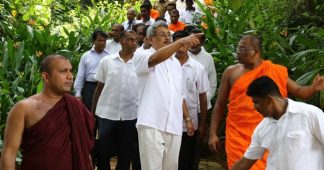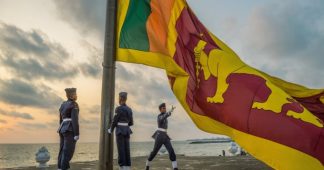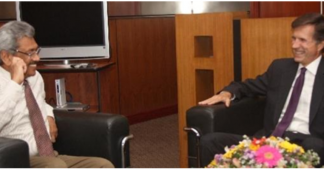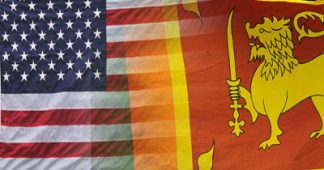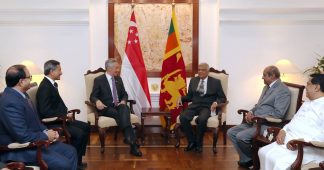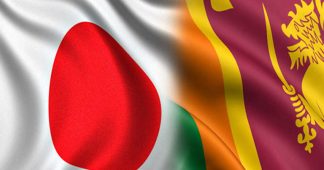By Lasanda Kurukulasuriya
Sep. 19, 2019
With just weeks to go for the Nov.16 presidential election, Sri Lanka’s voters are still left guessing as to the programs the main contenders might introduce if they win. The uncertainty comes against a backdrop where competing big powers are showing increased interest in Sri Lanka for their own reasons of strategy. It is known that external forces meddled in ways that affected the outcome of the 2015 presidential poll, which saw a US-friendly coalition led by the United National Party (UNP) come to power. With big power competition in the Indian Ocean region intensifying, the prospect of external influence being at play arises again, at this election.
While the UNPis mired in an internal battle over the choice of a candidate, the Opposition’s Sri Lanka Podujana Pakshaya (SLPP) – a new party headed by Mahinda Rajapaksa,announced that the former president’s brother Gotabaya will run for the presidency.The wartime defence secretarymade use of a recent event organized by his supporters to make a wide ranging vision statement,showinga sophisticated awareness of the importance of the international dimension in the backdrop of theelection. “Sri Lanka is a free, sovereign and an independent country. As our country is most strategically situated in the naval routes connecting the East and the West, we have once again become the focus of global powers” he said, addressing the ‘Viyathmaga 2019’ convention on 8th Sept. he went on to quote Parag Khanna‘s “The Future is Asian“: “Today all of Asia’s empires and powers are seeking national revival. None will bow to others. The future Asian geopolitical order will thus be neither American nor Chinese led.” Asians in particular have realized that economic integration and prosperity require geopolitical stability, he quoted Khanna as saying.
Concerns over Sri Lanka-US agreements
Though there was no equivocation in the announcement of Gotabaya’s candidacy, analysts have speculated regardingissues surroundingthe renunciation of his US citizenship(a prerequisite for contesting) and possible trade-offs with the Americans. “Washington needs Sri Lanka as a military hub as opposed to opening a military base to execute its Indo-Pacific regional militarization plan. The speedy resolution of the citizenship issue is well linked to America’s strategy to use Sri Lanka in such a manner under a Rajapaksa administration” saidWashington-based defence analyst Daya Gamage, writing in the Asian Tribunelast month.We also know that US ambassador Alaina Teplitz held ‘cordial discussions’ twice with Opposition Leader Mahinda Rajapaksa – in July, and then in August the day of the SLPP’s convention, at which he was formally named leader of the new party. The latter visit was in the company of US Acting Assistant Secretary for South and Central Asia, Alice Wells.
In order to dispel doubts that are created by the ambiguity surrounding these matters,Gotabaya needs to clarify his stance regarding the secretive and one-sideddefencerelated agreements with the US that have caused serious concern after details were revealed in the media. These are theACSA (Acquisition and Cross Service Agreement) signed by the government in 2017, and the SOFA (Status of Forces Agreement) said to be under negotiation.
Indeed, all presidential aspirants would need to be more forthcoming on how they intend to navigate geopolitical pressures resulting from US-China rivalry in the region. Till now, they have adopted an ostrich-like attitude towards the Sri Lanka-US agreements and related issues that continue to swirl around. In addition to sovereignty and security-relatedconcerns, any aspiring leaderwould have to consider how these dealscould compromise Sri Lanka’s relations with other friendly nations, shrinking the country’s strategic space and unnecessarily placing it in the cross-hairs ofnuclear-powered big power conflicts that could dangerously escalate.
Ruling party divided
Divisions over choice of presidential nominee have threatened to split the ruling UNP. The party’s deputy leader Sajith Premadasahas come forward as a strong contendereven as party leader Prime Minister Ranil Wickremesinghe says he will be the nominee, while SpeakerKaru Jayasuriya has also thrown his hat in the ring.
Finance Minister Mangala Samaraweera, who publicly backs Premadasa, was asked at a recent media briefing about the status of the US’sMillennium Challenge Corporation (MCC) compact – another controversial agreement with economic and strategic ramifications. He is on record vowing it will ‘definitely be signed.’ If it is not done in the next few months the UNP has expressed its desire to do so when it comes to power, he said.
Two questions arise from Samaraweera’s remarks. Could he make such a pledge on behalf of the Premadasa-led UNP campaign, unless Premadasa himself is party to it?And if Premadasa has agreed, why has he kept quiet about it while a partyheavyweight like Samaraweeramakes public statements?While Samaraweera’s pro-US leanings are no secret, the MCC’s strongest supporter in Sri Lankahas beenpro-US Prime Minister Wickremesinghe, who is battling Premadasa for the UNP nomination. The US however has no permanent friends, only permanent interests. It would favour any candidate who helps advance its global agenda – notwithstanding its hypocritical protestations about war crimes and human rights.
US-China rivalry and Indian Ocean conferences
With US moves to extend its influence in the Indian Ocean region (IOR) intensifying in recent years, numerousconferenceshave been convened on related topics.The ‘Indian Ocean Conference’ (IOC) organized by the India Foundation concluded its fourth edition earlier this month in the Maldives. It waschaired by Sri Lankan PM Wickremesinghe.
IOC’s deliberations each year have been underpinned by the converging regional interests of the US and India – a strategic partner of the US. The Americans use such forumsto give currency to their new terminology of ‘Indo Pacific’that linksthe Indian Ocean with the Pacific Ocean. This could be seen as a conceptual device which, at the level of optics, would help the US extend its military build-up in the Pacific theatre,into the IOR. The renaming of its Pacific Command as ‘Indo Pacific Command’ could be seen as a related move. It is also interesting that the first and third IOCs were held in Singapore and Vietnam – in Southeast Asia – while the second and fourth were in Colombo and the Maldives, in South Asia – again ‘blurring the boundaries.’
Though China’s representation (if any) was low key in the first three editions of IOC,this year it is reported thatdelegates from the US and China sparred openly.The US diplomat was none other than former commander of US Pacific Command, Adm. Harry Harris, now serving as ambassador to South Korea. Harris is reported to have launched a “scathing attack on China” leading to a “tense environment” with Chinese diplomat Wei Hongtian voicing his disagreement to Harris’s strong sentiments, according to theANI report. What is interesting is that Harris’s diatribewas unrelated toany specific Chinese activity in the Indian Ocean, but included China’s treatment of the Uighurs, the Belt and Road initiative and its ‘behaviour in the South China Sea.’ So now the South China Sea, a maritime flashpoint in the Pacific, has become fair game at an Indian Ocean conference!
Another point of interest at IOC-4 was the more assertive tone of India. Its External Affairs Minister S Jaishankaradopted the US’s terminology of ‘Indo Pacific’ and ‘freedom of navigation and overflight’ which his predecessor, the late Sushma Swaraj had been careful to avoid.Jaishankar is reported to have said the Indo-Pacific is “the logical step after Act East and a break out from the confines of South Asia.”He had added that “Given the steady externalisation of its economy, and the shifting focus towards the East, India cannot remain unaffected by developments that impinge on the freedom of navigation or of overflight.” While the speech ties in with the second-term-Modi government’s more ‘offensive’ approach to foreign policy, it also aligns India with US interests more openly than before. It is not clear how other IOR states reacted.
IOR states are not the only ones faced with the dilemmas of navigating US-China rivalry, small states in Southeast Asia too are grappling with a similar situation, it appears. At the Shangri La Dialogue hosted by Singapore in June, host-prime minister Lee Hsien Loong remarked that while small states may seem powerless in the face of big power rivalry, they are ‘not entirely without agency.’ “We maintain links with both sides, but to actively avoid taking sides actually also requires actively not being pressured to take sides,” he is reported as having said, prompting laughter, according to Bhavan Jaigpragas writing in the South China Morning Post.“And unfortunately, when the lines start to get drawn, everybody asks: ‘Are you my friend or not my friend?’ And that makes it difficult.”
